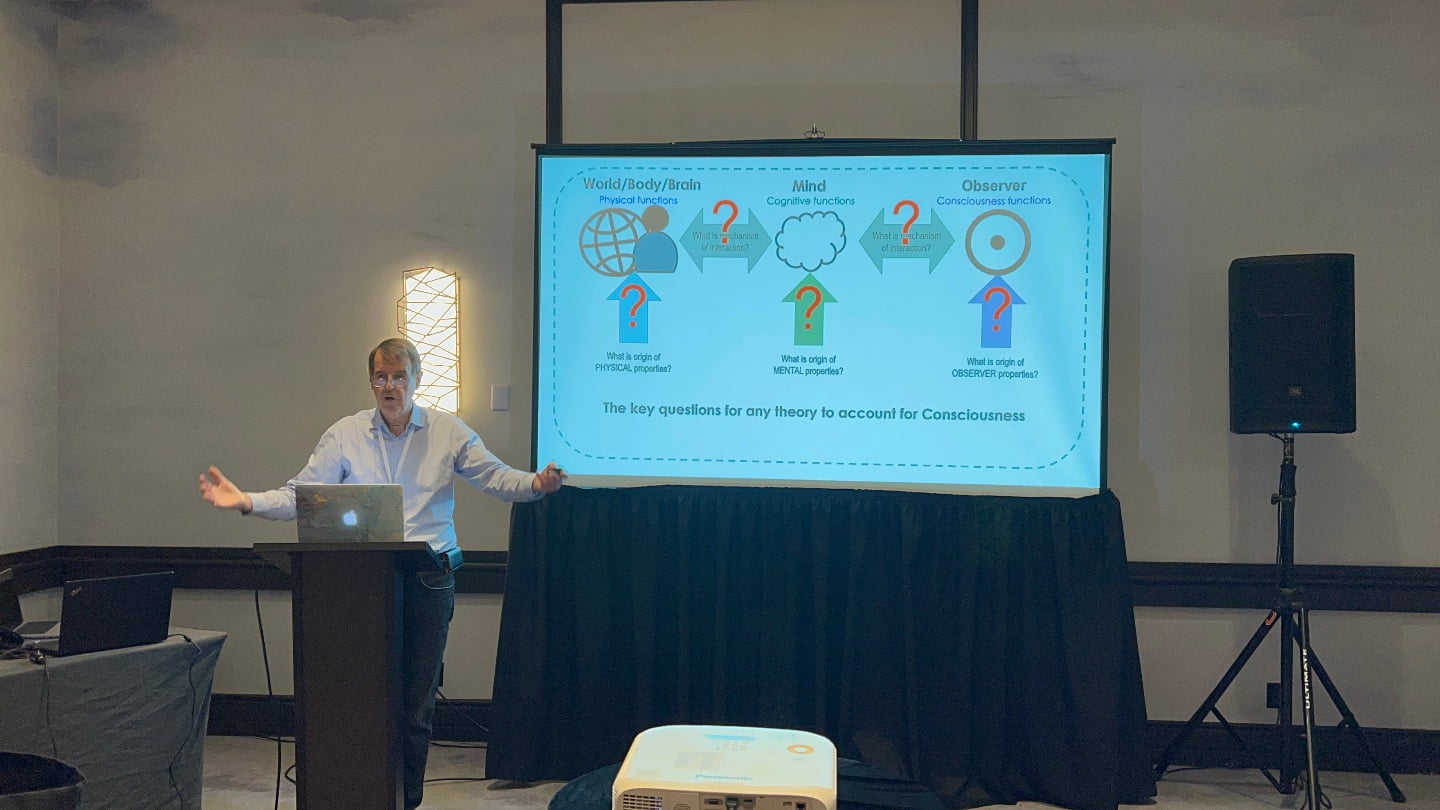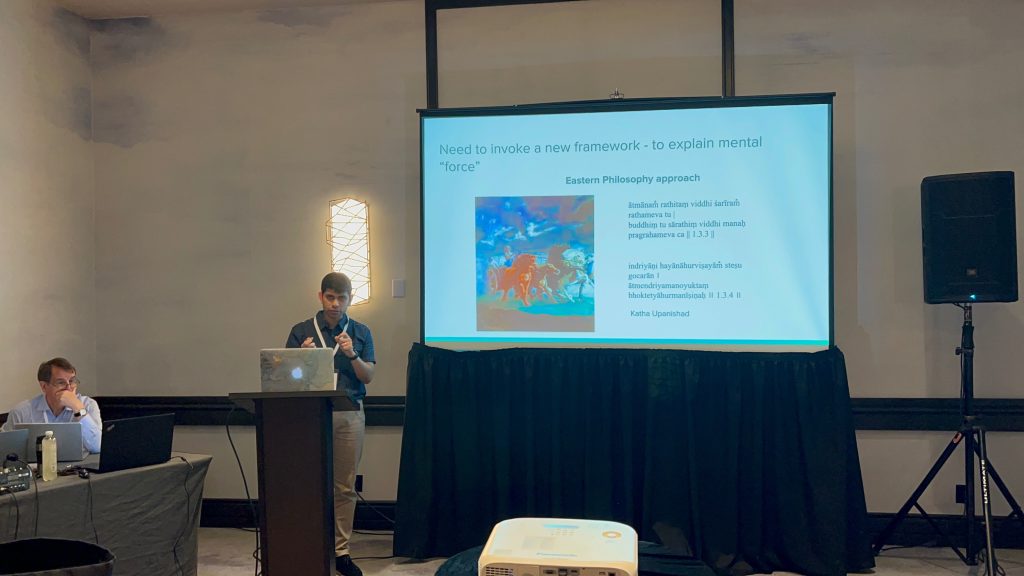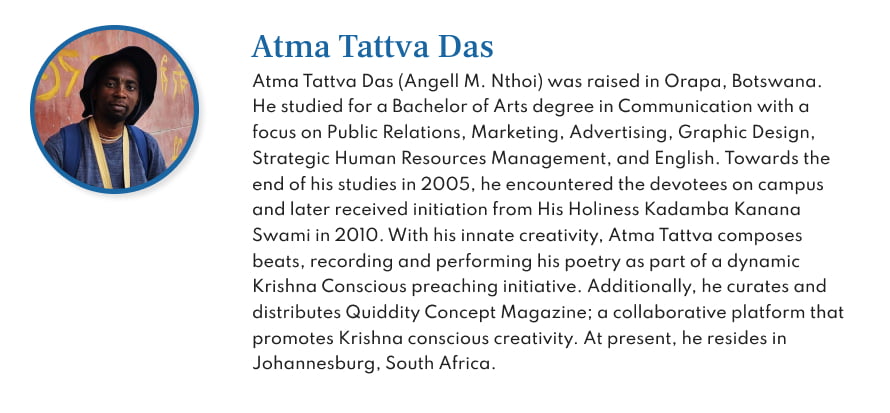Bhaktivedanta Institute for Higher Studies Joins University of Arizona’s Conference on Consciousness
By Atma Tattva Das, ISKCON News Staff Writer | Jun 11, 2024

Akhandadhi Das (Martin Fleming) opened the workshop with a summary of Vaishnava Vedanta and Sankhya metaphysics which could address the problematic gaps in current thinking about the interaction of the conscious agent, the mind and the brain.
The Bhaktivedanta Institute for Higher Studies (BIHS) made a significant achievement by participating in the University of Arizona’s Conference on Consciousness in Science, April 22 – 27, 2024. The event brought together researchers, philosophers, and scientists to explore the nature of consciousness and marked a significant moment for the devotee community. It reflects Srila Prabhupada’s vision of bridging Vedic wisdom and modern scientific inquiry.
Distinguished devotee scientists from BIHS were invited to lead a four-hour workshop on the opening day. The purpose was to introduce the unique perspectives found in the Srimad Bhagavatam and other Vedic scriptures to a diverse audience of researchers, philosophers, and scientists. Their participation indicates the growing acceptance of non-physicalist views on consciousness within the scientific community.
A member of the BIHS team in attendance was Drutakarma Dasa (Michael Cremo), a prolific author and researcher with BIHS who is known for his extensive body of work. Currently, he is leading a book club at BIHS, where they are discussing his book Human Devolution. He emphasizes the importance of this opportunity, stating, “We were not just attendees, but active participants in shaping the discourse around consciousness.” He further elaborated on the impact of their presence, saying, “We were there to demonstrate that our ideas are not only spiritually enriching but also intellectually rigorous and scientifically valuable.”
This sentiment was echoed by Akhandadhi Das (Martin Fleming), who is a former temple president of the Bhaktivedanta Manor. He currently leads the Science Philosophy Initiative, a parallel unit to the Bhaktivedanta Institute for Higher Studies, where he also serves on the board of directors. Additionally, he serves as the Content Director for the TOVP Science Museum. Akhandadhi is the presenter of the Atma Paradigm, a 30-hour series exploring the nature of the soul through science and Sankhya philosophy. “The Srimad Bhagavatam provides a precise description of the interactions between consciousness, mind, and matter,” he explained. “This is a great contribution to the interests of many researchers in this conference.”

BIHE team member Guruprasad Raghavan presented a paper exploring three particular phenomena: OCD, neural plasticity and the issue of defining the end of life, each of which conjure challenges for the physicalist idea that consciousness is a product of the brain.
The conference showcased a significant shift in the scientific community’s approach to consciousness studies. Akhandadhi noted an increased openness to exploring broader understandings of consciousness compared to previous mainstream neuroscience conferences. According to him, there is now more willingness, especially among young researchers, to explore a wider range of understandings.
Brahmatirtha Dasa (Bob Cohen), a member of the Bhaktivedanta Institute since its founding in 1976 and current BIHE Director, also noticed a change in the scientific community’s views towards non-physicalism, which began at Srila Prabhupada’s 1977 conference “Life Comes from Life.” This shift was highlighted by Christof Koch, a respected scientist, who openly discussed his transition from a purely physicalist viewpoint to a more inclusive understanding of consciousness influenced by a mystical experience.
The BIHS team also brought along a publication from a previous workshop on mind and consciousness interaction, which the conference attendees enthusiastically received. “We were there to share our analysis and references to Prabhupada’s books within those papers,” said Akhandadhi. “The literature we provided was quickly picked up, indicating a strong interest in our perspective.”
One of the conference’s highlights was a session on the boundary question of consciousness – how our conscious experience changes between different states of consciousness. Drutakarma mentioned that they discussed why individuals experience consciousness with particular boundaries, and the Gaudiya Vaishnava tradition offers valuable insights into this area. “Our tradition teaches that consciousness is not just an emergent property of brain activity but is a fundamental aspect of reality,” Drutakarma explained. “This perspective can significantly enrich scientific discussions and open new pathways for research.”
The BIHS team discovered that David Chalmers is the renowned philosopher who originally coined the phrase “The Hard Problem of Consciousness” at this conference thirty years earlier. In a plenary talk, he remembered his journey into the subject of consciousness and how, shortly after completing his studies, he attended his first consciousness conference held, he said, by the Bhaktivedanta Institute in San Francisco.
The BIHS team engaged in meaningful dialogues with other researchers, fostering a collaborative spirit. “We aim to help these researchers refine their philosophical conceptions to include possibilities from Gaudiya Vaishnava ideas about the nature of the self and consciousness,” Drutakarma added.
Looking to the future, BIHS has ambitious plans. They are organizing a major event in 2027 to mark the 50th anniversary of “Life Comes from Life.” “Our work now is paving the way for something extraordinary in 2027,” said Brahmatirtha. Drutakarma also expressed excitement about the upcoming event, noting, “We are committed to pushing the boundaries of consciousness studies and bringing Vedic insights to the forefront of scientific discourse.”
Reflecting on the conference, Akhandadhi expressed optimism about the evolving landscape of consciousness studies. “The BIHS is in a much stronger position now, with many connections and a growing network of devotee scientists worldwide,” he said. “We invite any interested scientists to join us in our efforts.” As the world of consciousness studies evolves, the BIHS remains at the forefront, dedicated to exploring and elucidating the mysteries of the mind and the self.
The participation of the Bhaktivedanta Institute for Higher Studies in the University of Arizona’s Conference on Consciousness represents a pivotal moment in the integration of science and consciousness-based philosophy. As they continue to bridge these fields, their contributions promise to enrich the global understanding of consciousness, inspiring future research and collaboration.
For more information on the BIHS and its upcoming initiatives, visit its website, or contact Brahmatirtha via email. You may also visit their YouTube channel for previous content.















